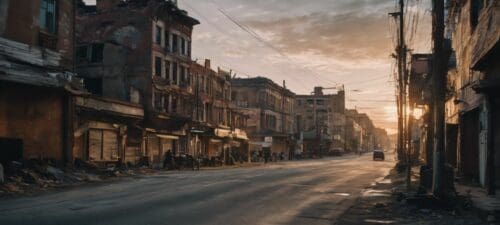L.A. Noire: Detective Work in Post-War Los Angeles

Updated On: October 23, 2025 by 
Have you ever had the nagging sensation that there’s a gap in your historical understanding whilst meandering through the digital realms of video games? You’re certainly not alone; many of us share that curiosity, which is precisely what propelled us to delve into the captivating story behind ‘L.A.
Noire’. This blog is set to transport you back to 1947 Los Angeles, a time when detective work was as unyielding as the pavements of the city and every choice held weight. So join us, pour yourself a cuppa and get comfortable as we untangle the mysteries together!
Setting the Scene of Post-War Los Angeles
Post-War Los Angeles was a city grappling with the aftermath of World War II, experiencing social and political change. The LAPD played a pivotal role in maintaining law and order during this period.
Background of the city
Los Angeles in 1947 stood as a bustling urban sprawl, emerging from World War II with its own share of scars and stories. The city’s air thrummed with the optimism of post-war recovery, yet beneath the surface, a complex web of social tensions and economic ambitions simmered.
Our virtual Los Angeles reimagines this iconic era, where glitzy Hollywood glamour collides with the gritty undertones of crime and corruption.
Strolling through the meticulously recreated streets in L.A. Noire, we immerse ourselves in an authentic landscape that echoes with jazz music and is shrouded in smoggy shadows. Skyscrapers tower over us while vintage cars navigate around palm-lined boulevards; it’s here where our detective story unfolds.
The game captures not just the look but also the atmosphere of a pivotal time when modern Los Angeles was being forged amidst societal transformations and moral dilemmas.
Political and social climate
In 1947, the political and social climate in post-war Los Angeles was marked by significant changes and tensions. The aftermath of World War II brought about shifts in the city’s demographics, with an influx of veterans seeking new opportunities and a growing population fuelling urban expansion.
Amidst this period of transformation, issues such as racial segregation and organised crime were prevalent, shaping the dynamics within the community. Additionally, there was a palpable sense of unease stemming from societal anxieties about communism and shifting gender roles.
The political landscape also reflected these complexities as post-war America grappled with Cold War politics. The Red Scare led to increased scrutiny on individuals suspected of communist sympathies, creating an atmosphere of suspicion and paranoia that permeated various aspects of daily life.
As players delve into L.A. Noire’s narrative, they will navigate through this intricate web of social tensions while grappling with cases that reflect the underlying turmoil gripping post-war Los Angeles.
Role of the LAPD
The LAPD plays a central role in L.A. Noire, as the game revolves around the experiences of Cole Phelps, a detective for the Los Angeles Police Department and a Marine veteran of Okinawa.
As players progress through the game, they witness how detectives are assigned cases by their department’s Captain and have at their disposal a wide range of investigative techniques to solve them.
The game provides an immersive depiction of 1940s Los Angeles with its mean streets, offering an engaging experience that showcases the challenges and complexities of detective work in post-war America.
Meet Cole Phelps, Veteran and Detective
Cole Phelps is the protagonist of L.A. Noire, a veteran who returns from World War II and joins the LAPD as a detective. With his keen attention to detail, sharp intuition, and dedication to solving cases, he navigates through the post-war Los Angeles with determination.
His relationships with other characters add depth to the game’s narrative and keep players engaged throughout their journey in 1947 Los Angeles.
Backstory
Meet Cole Phelps, a Marine veteran of Okinawa and a former member of the Los Angeles Police Department. With his sharp mind and unwavering determination, he quickly rises through the ranks to become an esteemed detective in post-war Los Angeles.
His experience in the war has honed his skills and given him a unique perspective on crime-solving, making him an invaluable asset to the LAPD.
Phelps’s relationships with other characters are shaped by his past experiences, influencing how he approaches each case. As players navigate through the game, they’ll uncover layers of Phelps’s backstory that add depth to his character and motivations as they unravel mysteries across post-war Los Angeles.
Traits and skills
Cole Phelps, the protagonist of L.A. Noire, exhibits a diverse range of traits and skills that make him an exceptional detective in post-war Los Angeles. As a Marine veteran of Okinawa, Phelps possesses unwavering determination and mental resilience.
His highly intelligent and methodical nature enables him to approach cases with precision and attention to detail, while his adaptability allows him to navigate through the city’s mean streets effectively.
With strong interrogation techniques, strategic problem-solving abilities, and sharp observation skills, Phelps proves himself as an adept detective capable of cracking even the most challenging cases.
Relationships with other characters
After honing his traits and skills in detective work, Cole Phelps forms intricate relationships with a range of characters throughout the game. As players progress through L.A. Noire, they’ll navigate complex interactions with colleagues, suspects, informants, and other figures entrenched in the post-war Los Angeles social fabric.
These connections serve to deepen the narrative and challenge players to navigate the murky morality of their choices as a detective.
Detective Phelps’ relationships are marked by tension and intrigue, reflecting the intricate web of alliances and betrayals within the city’s underbelly. The game immerses players in these dynamic interpersonal dynamics, enhancing both gameplay immersion and storytelling depth while mirroring the complexities of real-life police work during this era.
Gameplay and Narrative
Players dive into the intricate world of detective work, solving cases and making critical choices that affect the narrative outcome. Read on to discover how L.A. Noire brings post-war Los Angeles to life through immersive gameplay.
Solving cases as a detective
In L.A. Noire, players take on the role of Cole Phelps, a detective tasked with solving a variety of cases in post-war Los Angeles. Here’s what the gameplay entails:
- Players must gather evidence at crime scenes, using their keen observation skills to find clues and piece together the puzzle.
- They interrogate suspects, a crucial aspect of detective work in the game where players must judge characters’ honesty through body language and facial expressions.
- The game offers a unique feature called “Truth/ Doubt/ Lie” during interrogations, allowing players to choose their approach based on the evidence collected.
- As they solve cases, players navigate through different neighbourhoods and iconic locations in 1940s Los Angeles, immersing them in the era’s atmosphere and challenges.
- Players are required to analyse evidence and make deductions to progress through cases, mirroring real detective work by exercising logical reasoning.
Choices and consequences
As we navigate the intricacies of detective work in post-war Los Angeles, the game L.A. Noire confronts players with a series of choices and their ensuing consequences. Each decision made by Cole Phelps as he solves cases has a direct impact on the unfolding narrative, creating a sense of agency and personal responsibility for the player.
Whether it’s choosing to pursue a lead aggressively or delicately interrogate a suspect, every action shapes the outcome of each case and influences Phelps’ progression within the LAPD.
The game’s emphasis on detailed storytelling and realistic consequences provides an immersive experience that challenges players to think critically about their decisions as they unravel the mysteries of 1940s Los Angeles.
The game’s focus on detail and realism
With its focus on detail and realism, L.A. Noire brings post-war Los Angeles to life in a breathtakingly authentic manner. From the city streets to the interior spaces, meticulous attention has been paid to recreating every aspect of 1940s Los Angeles.
The game’s immersive experience is heightened by the accurate portrayal of investigative techniques and crime-solving procedures used by detectives during that era, providing players with a true sense of what it was like to be a detective in post-war America.
The level of detail extends beyond just the visual aspects – dialogue, character interactions, and period-accurate music all contribute to a truly authentic gaming experience. As players navigate through the dark and dangerous world of post-war Los Angeles as Cole Phelps, they are fully immersed in an era where justice often meant walking a fine line between moral ambiguity and legal enforcement.
Reception and Legacy
L.A. Noire received critical acclaim for its attention to detail and innovative gameplay, earning praise for its unique approach to detective work. The game’s impact on the gaming industry can still be felt today, with many titles drawing inspiration from its storytelling and investigative mechanics.
Critic and player reviews
Critic and player reviews have lauded L.A. Noire for its immersive storytelling, authentic setting, and innovative gameplay mechanics. The game’s attention to detail in recreating 1940s Los Angeles has been widely praised, with many highlighting the rich historical backdrop that adds depth to the overall experience.
Critics and players alike have commended the game’s compelling narrative, which provides a unique perspective on post-war America through the eyes of a detective navigating the city’s dark underbelly.
Furthermore, L.A. Noire’s emphasis on detective work has resonated positively with both critics and gamers. The game’s investigative gameplay mechanics offer a refreshing change of pace within the gaming industry, allowing players to engage in intricate case-solving while immersing themselves in an authentic portrayal of police procedures during that era.
Impact on the gaming industry
L.A. Noire’s detailed and immersive historical setting has had a significant impact on the gaming industry, offering a unique blend of detective work and narrative storytelling. The game’s focus on realism, detail-oriented gameplay, and branching narrative choices has set a new standard for interactive storytelling in the gaming world.
L.A. Noire has influenced subsequent games by demonstrating that players are drawn to richly detailed historical settings and complex narratives, shaping the way developers approach storytelling and player agency in game design.
The intricate portrayal of post-war Los Angeles in L.A. Noire has resonated with both game experts and gamer novices alike, showcasing the potential for games to deliver compelling historical experiences while also providing engaging gameplay mechanics.
Conclusion
In conclusion, L.A. Noire immerses players in the intricate world of detective work in post-war Los Angeles. The game’s focus on detail and realism provides an engaging and immersive experience, showcasing the challenges and complexities faced by detectives during this period.
Its compelling narrative offers a unique perspective on the era, making it one of gaming’s greatest historical settings. Experience the mean streets of 1940s Los Angeles as you step back through history in this captivating portrayal of detective work in a tumultuous time.
FAQs
1. What is L.A. Noire about?
L.A. Noire is a video game where you play as a police officer solving mysteries in Los Angeles just after World War II, filled with suspense and detective work.
2. Can I solve crimes as a detective in the game?
Yes, as a player you step into the shoes of a post-war police officer who cracks complex cases through investigation and intuition.
3. Is L.A. Noire set in modern-day Los Angeles?
No, L.A. Noire takes place in Post-War Los Angeles; it captures the atmosphere of the city’s past era with its unique challenges and aesthetics.
4. Does playing L.A. Noire feel like being in an actual mystery?
Absolutely! The game immerses you into the role of a detective amidst the intrigue and suspense characteristic of post-war crime scenes.









